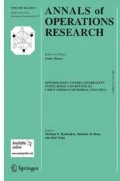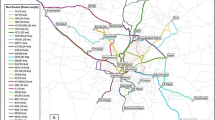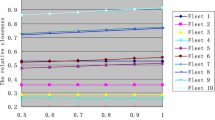Abstract
Sustainable freight transportation is aimed at reducing environmental emissions and social inequity along with economic inefficiency to drive the business. Lack of a continuous sustainability assessment and monitoring tool increases the reluctance of freight transporters to adopt world-class sustainability practices. This paper attempts to develop the performance index for a sustainable freight transportation system by innovatively integrating the Consensus Model (CM) with the Fuzzy Evidential Reasoning Algorithm (FERA). A CM has been used to determine the degree of importance of each Key Performance Indicators identified across three dimensions of sustainability. FERA has been used to aggregate subjective judgments with crisp quantitative values. This approach has a unique capability to handle various uncertainties related to impreciseness in decision-making. This study has demonstrated the use of an integrated approach for developing a performance index of the freight transportation system. Sensitivity Analysis of the model provides logical inferences and an understanding of the robustness of the model outputs. It can be interpreted from the results of the study that the firms with higher profitability in the market are focusing more on making their operations sustainable. A proportionate approach of firms towards the economic, environment, and societal well-being, may assist in achieving higher sustainability.







Similar content being viewed by others
References
Abbasi, M., & Nilsson, F. (2016). Developing environmentally sustainable logistics: Exploring themes and challenges from a logistics service providers’ perspective. Transportation Research Part D: Transportation and Environment, 46, 273–283.
Acquaye, A., Ibn-Mohammed, T., Genovese, A., Afrifa, G. A., Yamoah, F. A., & Oppon, E. (2018). A quantitative model for environmentally sustainable supply chain performance measurement. European Journal of Operational Research, 269(1), 188–205.
Agarwal, A., Shankar, R., & Tiwari, M. K. (2006). Modeling metrics of lean and agile supply chain. European Journal of Operational Research, 173, 211–225.
Aguezzoul, A. (2014). Third-party logistics selection problem: A literature review on criteria and methods. Omega, 49, 69–78.
Amrina, E., & Vilsi, A. L. (2015). Key performance indicators for sustainable manufacturing evaluation in cement industry. Procedia CIRP, 26(1), 19–23.
Awasthi, A., Adetiloye, T., & Crainic, T. G. (2016). Collaboration partner selection for city logistics planning under municipal freight regulations. Applied Mathematical Modelling, 40(1), 510–525.
Bappy, M. M., Ali, S. M., Kabir, G., & Paul, S. K. (2019). Supply chain sustainability assessment with Dempster–Shafer evidence theory: Implications in cleaner production. Journal of Cleaner Production, 237, 117771.
Behrends, S., Lindholm, M., & Woxenius, J. (2008). The impact of urban freight transport: A definition of sustainability from an actor’s perspective. Transportation planning and technology, 31(6), 693–713.
Björklund, M., & Gustafsson, S. (2015). Toward sustainability with the coordinated freight distribution of municipal goods. Journal of Cleaner Production, 98, 194–204.
Choudhury, A. K., Shankar, R., & Tiwari, M. K. (2006). Consensus-based intelligent group decision-making model for the selection of advanced technology. Decision Support Systems, 42(3), 1776–1799.
Chow, J. Y., Yang, C. H., & Regan, A. C. (2010). State-of-the art of freight forecast modeling: Lessons learned and the road ahead. Transportation, 37(6), 1011–1030.
Demir, E., Burgholzer, W., Hrušovský, M., Arıkan, E., Jammernegg, W., & Van Woensel, T. (2016). A green intermodal service network design problem with travel time uncertainty. Transportation Research Part B: Methodological, 93, 789–807.
Demir, E., Huang, Y., Scholts, S., & Van Woensel, T. (2015). A selected review on the negative externalities of the freight transportation: Modeling and pricing. Transportation Research Part E: Logistics and Transportation Review, 77, 95–114.
Duan, C., Deng, C., Gharaei, A., Wu, J., & Wang, B. (2018). Selective maintenance scheduling under stochastic maintenance quality with multiple maintenance actions. International Journal of Production Research, 56(23), 7160–7178.
Dubey, R., Gunasekaran, A., Sushil, & Singh, T. (2015). Building theory of sustainable manufacturing using total interpretive structural modelling. International Journal of Systems Science: Operations & Logistics, 2(4), 231–247.
Evangelista, P. (2014). Environmental sustainability practices in the transport and logistics service industry: An exploratory case study investigation. Research in Transportation Business & Management, 12, 63–72.
Falsini, D., Fondi, F., & Schiraldi, M. M. (2012). A logistics provider evaluation and selection methodology based on AHP, DEA and linear programming integration. International Journal of Production Research, 50(17), 4822–4829.
Forslund, H. (2007). The impact of performance management on customers’ expected logistics performance. International Journal of Operations & Production Management, 27(8), 901–918.
Fu, C., Yang, J. B., & Yang, S. L. (2015). A group evidential reasoning approach based on expert reliability. European Journal of Operational Research, 246(3), 886–893.
Gharaei, A., Hoseini Shekarabi, S. A., & Karimi, M. (2019a). Modelling and optimal lot-sizing of the replenishments in constrained, multi-product and bi-objective EPQ models with defective products: Generalised cross decomposition. International Journal of Systems Science: Operations & Logistics, 7(3), 262–274.
Gharaei, A., Karimi, M., & Hoseini Shekarabi, S. A. (2019b). Joint economic lot-sizing in multi-product multi-level integrated supply chains: Generalized benders decomposition. International Journal of Systems Science: Operations & Logistics, 7(4), 309–325.
Gharaei, A., Hoseini Shekarabi, S. A., Karimi, M., Pourjavad, E., & Amjadian, A. (2019c). An integrated stochastic EPQ model under quality and green policies: Generalised cross decomposition under the separability approach. International Journal of Systems Science: Operations & Logistics. https://doi.org/10.1080/23302674.2019.1656296.
Gharaei, A., Karimi, M., & Shekarabi, S. H. (2018). An integrated multi-product multi-buyer supply chain under the penalty, green, and VMI-CS policies: OA/ER/AP algorithm. Applied Mathematical Modelling, 69, 223–254.
Giri, B. C., & Bardhan, S. (2014). Coordinating a supply chain with backup supplier through buyback contract under supply disruption and uncertain demand. International Journal of Systems Science: Operations & Logistics, 1(4), 193–204.
Giri, B. C., & Masanta, M. (2020). Developing a closed-loop supply chain model with price and quality dependent demand and learning in production in a stochastic environment. International Journal of Systems Science: Operations & Logistics, 7(2), 147–163.
Ha, M. H., Yang, Z., Notteboom, T., Ng, A. K., & Heo, M. W. (2017). Revisiting port performance measurement: A hybrid multi-stakeholder framework for the modelling of port performance indicators. Transportation Research Part E: Logistics and Transportation Review, 103, 1–16.
Hassini, E., Surti, C., & Searcy, C. (2012). A literature review and a case study of sustainable supply chains with a focus on metrics. International Journal of Production Economics, 140(1), 69–82.
He, Z., Chen, P., Liu, H., & Guo, Z. (2017). Performance measurement system and strategies for developing low-carbon logistics: A case study in China. Journal of Cleaner Production, 156, 395–405.
Hervani, A. A., Helms, M. M., & Sarkis, J. (2005). Performance measurement for green supply chain management. Benchmarking: An International Journal, 12(4), 330–353.
Holden, R., Xu, B., Greening, P., Piecyk, M., & Dadhich, P. (2016). Towards a common measure of greenhouse gas related logistics activity using data envelopment analysis. Transportation Research Part A: Policy and Practice, 91, 105–119.
Hubbard, G. (2009). Measuring organizational performance: beyond the triple bottom line. Business Strategy and the Environment, 18(3), 177–191.
Hult, G. T. M., Ketchen, D. J., Jr., Cavusgil, S. T., & Calantone, R. J. (2006). Knowledge as a strategic resource in supply chains. Journal of Operations Management, 24(5), 458–475.
Jharkharia, S., & Shankar, R. (2007). Selection of logistics service provider: An analytic network process (ANP) approach. Omega, 35(3), 274–289.
Jiang, D., Wu, B., Yang, X., & Van Gelder, P. H. A. J. M. (2019). A fuzzy evidential reasoning based approach for submarine power cable routing selection for offshore wind farms. Ocean Engineering, 193, 106616.
Kazemi, N., Abdul-Rashid, S. H., Ghazilla, R. A. R., Shekarian, E., & Zanoni, S. (2018). Economic order quantity models for items with imperfect quality and emission considerations. International Journal of Systems Science: Operations & Logistics, 5(2), 99–115.
Kijewska, K., & Johansen, B. G. (2014). Comparative analysis of activities for more environmental friendly urban freight transport systems in Norway and Poland. Procedia-Social and Behavioral Sciences, 151, 142–157.
Kumar, A., & Anbanandam, R. (2019). Development of social sustainability index for freight transportation system. Journal of Cleaner Production, 210, 77–92.
Kumar, A., & Anbanandam, R. (2020). Assessment of environmental and social sustainability performance of the freight transportation industry: An index-based approach. Transport Policy. https://doi.org/10.1016/j.tranpol.2020.01.006.
Kumar, S., Teichman, S., & Timpernagel, T. (2012). A green supply chain is a requirement for profitability. International Journal of Production Research, 50(5), 1278–1296.
Lemmens, S., Decouttere, C., Vandaele, N., & Bernuzzi, M. (2016). A review of integrated supply chain network design models: Key issues for vaccine supply chains. Chemical Engineering Research and Design, 109, 366–384.
Li, Y., & Mathiyazhagan, K. (2018). Application of DEMATEL approach to identify the influential indicators towards sustainable supply chain adoption in the auto components manufacturing sector. Journal of Cleaner Production, 172, 2931–2941.
Lieb, K. J., & Lieb, R. C. (2010). Environmental sustainability in the third-party logistics (3PL) industry. International Journal of Physical Distribution & Logistics Management, 40(7), 524–533.
Liotta, G., Stecca, G., & Kaihara, T. (2015). Optimisation of freight flows and sourcing in sustainable production and transportation networks. International Journal of Production Economics, 164, 351–365.
Liu, C. L., & Lyons, A. C. (2011). An analysis of third-party logistics performance and service provision. Transportation Research Part E: Logistics and Transportation Review, 47(4), 547–570.
Liu, H. T., & Wang, W. K. (2009). An integrated fuzzy approach for provider evaluation and selection in third-party logistics. Expert Systems with Applications, 36(3), 4387–4398.
Lun, Y. V., Lai, K. H., Wong, C. W., & Cheng, T. C. E. (2015). Greening propensity and performance implications for logistics service providers. Transportation Research Part E: Logistics and Transportation Review, 74, 50–62.
Mani, V., Gunasekaran, A., & Delgado, C. (2018). Enhancing supply chain performance through supplier social sustainability: An emerging economy perspective. International Journal of Production Economics, 195, 259–272.
Márquez-Ramos, L. (2015). The relationship between trade and sustainable transport: A quantitative assessment with indicators of the importance of environmental performance and agglomeration externalities. Ecological Indicators, 52, 170–183.
Mehlawat, M. K., Kannan, D., Gupta, P., & Aggarwal, U. (2019). Sustainable transportation planning for a three-stage fixed charge multi-objective transportation problem. Annals of Operations Research, 1–37. https://doi.org/10.1007/s10479-019-03451-4.
Mitra, S., & Bagchi, P. K. (2008). Key success factors, performance metrics, and globalization issues in the third-party logistics (3PL) industry: A survey of North American service providers. Supply Chain Forum: An International Journal, 9(1), 42–54.
Mota, B., Gomes, M. I., Carvalho, A., & Barbosa-Povoa, A. P. (2018). Sustainable supply chains: An integrated modeling approach under uncertainty. Omega, 77, 32–57.
Mothilal, S., Gunasekaran, A., Nachiappan, S. P., & Jayaram, J. (2012). Key success factors and their performance implications in the Indian third-party logistics (3PL) industry. International Journal of Production Research, 50(9), 2407–2422.
Narimissa, O., Kangarani-Farahani, A., & Molla-Alizadeh-Zavardehi, S. (2020). Evaluation of sustainable supply chain management performance: Indicators. Sustainable Development, 28(1), 118–131.
Nijkamp, P. (1994). Roads toward environmentally sustainable transport. Transportation Research Part A: Policy and Practice, 28(4), 261–271.
Parreiras, R. O., Ekel, P. Y., Martini, J. S. C., & Palhares, R. M. (2010). A flexible consensus scheme for multicriteria group decision making under linguistic assessments. Information Sciences, 180(7), 1075–1089.
Pathak, D. K., Thakur, L. S., & Rahman, S. (2019). Performance evaluation framework for sustainable freight transportation systems. International Journal of Production Research, 57(19), 6202–6222.
Rabbani, M., Hosseini-Mokhallesun, S. A. A., Ordibazar, A. H., & Farrokhi-Asl, H. (2020). A hybrid robust possibilistic approach for a sustainable supply chain location-allocation network design. International Journal of Systems Science: Operations & Logistics, 7(1), 60–75.
Rabbi, M., Ali, S. M., Kabir, G., Mahtab, Z., & Paul, S. K. (2020). Green supply chain performance prediction using a Bayesian belief network. Sustainability, 12(3), 1101.
Rajesh, R., Pugazhendhi, S., Ganesh, K., Ducq, Y., & Koh, S. L. (2012). Generic balanced scorecard framework for third party logistics service provider. International Journal of Production Economics, 140(1), 269–282.
Rajesh, R., Pugazhendhi, S., Ganesh, K., Yves, D., Lenny Koh, S. C., & Muralidharan, C. (2011). Perceptions of service providers and customers of key success factors of third-party logistics relationships—An empirical study. International Journal of Logistics Research and Applications, 14(4), 221–250.
Ravi, V., Shankar, R., & Tiwari, M. K. (2005). Analyzing alternatives in reverse logistics for end-of-life computers: ANP and balanced scorecard approach. Computers & Industrial Engineering, 48(2), 327–356.
Reefke, H., & Sundaram, D. (2017). Key themes and research opportunities in sustainable supply chain management–identification and evaluation. Omega, 66, 195–211.
Sarkar, S., & Giri, B. C. (2020). Stochastic supply chain model with imperfect production and controllable defective rate. International Journal of Systems Science: Operations & Logistics, 7(2), 133–146.
Seuring, S., & Müller, M. (2008). From a literature review to a conceptual framework for sustainable supply chain management. Journal of Cleaner Production, 16(15), 1699–1710.
Shafiee, M., Lotfi, F. H., & Saleh, H. (2014). Supply chain performance evaluation with data envelopment analysis and balanced scorecard approach. Applied Mathematical Modelling, 38(21–22), 5092–5112.
Shah, N. H., Chaudhari, U., & Cárdenas-Barrón, L. E. (2020). Integrating credit and replenishment policies for deteriorating items under quadratic demand in a three echelon supply chain. International Journal of Systems Science: Operations & Logistics, 7(1), 34–45.
Shankar, R., Pathak, D. K., & Choudhary, D. (2019). Decarbonizing freight transportation: An integrated EFA-TISM approach to model enablers of dedicated freight corridors. Technological Forecasting and Social Change, 143, 85–100.
Shekarabi, H. S. A., Gharaei, A., & Karimi, M. (2019). Modelling and optimal lot-sizing of integrated multi-level multi-wholesaler supply chains under the shortage and limited warehouse space: generalised outer approximation. International Journal of Systems Science: Operations & Logistics, 6(3), 237–257.
Silvestre, B. S. (2015). Sustainable supply chain management in emerging economies: Environmental turbulence, institutional voids and sustainability trajectories. International Journal of Production Economics, 167, 156–169.
Tezuka, K. (2011). Rationale for utilizing 3PL in supply chain management: A shippers’ economic perspective. IATSS Research, 35(1), 24–29.
Thakkar, J., Deshmukh, S. G., Gupta, A. D., & Shankar, R. (2005). Selection of third-party logistics (3PL): A hybrid approach using interpretive structural modeling (ISM) and analytic network process (ANP). Supply Chain Forum: An International Journal, 6(1), 32–46.
Wei, D., Xu, D., & Zhang, Y. (2020). A fuzzy evidential reasoning-based approach for risk assessment of deep foundation pit. Tunnelling and Underground Space Technology, 97, 103232.
Woxenius, J. (2012). Directness as a key performance indicator for freight transport chains. Research in Transportation Economics, 36(1), 63–72.
Xu, D. L. (2012). An introduction and survey of the evidential reasoning approach for multiple criteria decision analysis. Annals of Operations Research, 195(1), 163–187.
Xu, X. H., Du, Z. J., & Chen, X. H. (2015). Consensus model for multi-criteria large-group emergency decision making considering non-cooperative behaviors and minority opinions. Decision Support Systems, 79, 150–160.
Yang, J. B., Wang, Y. M., Xu, D. L., & Chin, K. S. (2006). The evidential reasoning approach for MADA under both probabilistic and fuzzy uncertainties. European Journal of Operational Research, 171(1), 309–343.
Yang, J. B., & Xu, D. L. (2002). On the evidential reasoning algorithm for multiple attribute decision analysis under uncertainty. IEEE Transactions on Systems, Man, and Cybernetics-Part A: Systems and Humans, 32(3), 289–304.
Yin, S., Nishi, T., & Zhang, G. (2016). A game theoretic model for coordination of single manufacturer and multiple suppliers with quality variations under uncertain demands. International Journal of Systems Science: Operations & Logistics, 3(2), 79–91.
Zhang, M. J., Wang, Y. M., Li, L. H., & Chen, S. Q. (2017). A general evidential reasoning algorithm for multi-attribute decision analysis under interval uncertainty. European Journal of Operational Research, 257(3), 1005–1015.
Zheng, L., & Zhang, J. (2010). Research on green logistics system based on circular economy. Asian Social Science, 6(11), 116.
Zhu, Q., Geng, Y., & Lai, K. H. (2010a). Circular economy practices among Chinese manufacturers varying in environmental-oriented supply chain cooperation and the performance implications. Journal of Environmental Management, 91, 1324–1331.
Zhu, Q., Geng, Y., & Lai, K. H. (2010b). Circular economy practices among Chinese manufacturers varying in environmental-oriented supply chain cooperation and the performance implications. Journal of Environmental Management, 91(6), 1324–1331.
Zhu, Q., & Sarkis, J. (2004). Relationships between operational practices and performance among early adopters of green supply chain management practices in Chinese manufacturing enterprises. Journal of Operations Management, 22(3), 265–289.
Zhu, Q., & Sarkis, J. (2006). An inter-sectoral comparison of green supply chain management in China: drivers and practices. Journal of Cleaner Production, 14(5), 472–486.
Zito, P., & Salvo, G. (2011). Toward an urban transport sustainability index: An European comparison. European Transport Research Review, 3(4), 179–195.
Author information
Authors and Affiliations
Corresponding author
Additional information
Publisher's Note
Springer Nature remains neutral with regard to jurisdictional claims in published maps and institutional affiliations.
Rights and permissions
About this article
Cite this article
Fulzele, V., Shankar, R. Performance measurement of sustainable freight transportation: a consensus model and FERA approach. Ann Oper Res 324, 501–542 (2023). https://doi.org/10.1007/s10479-020-03876-2
Accepted:
Published:
Issue Date:
DOI: https://doi.org/10.1007/s10479-020-03876-2




